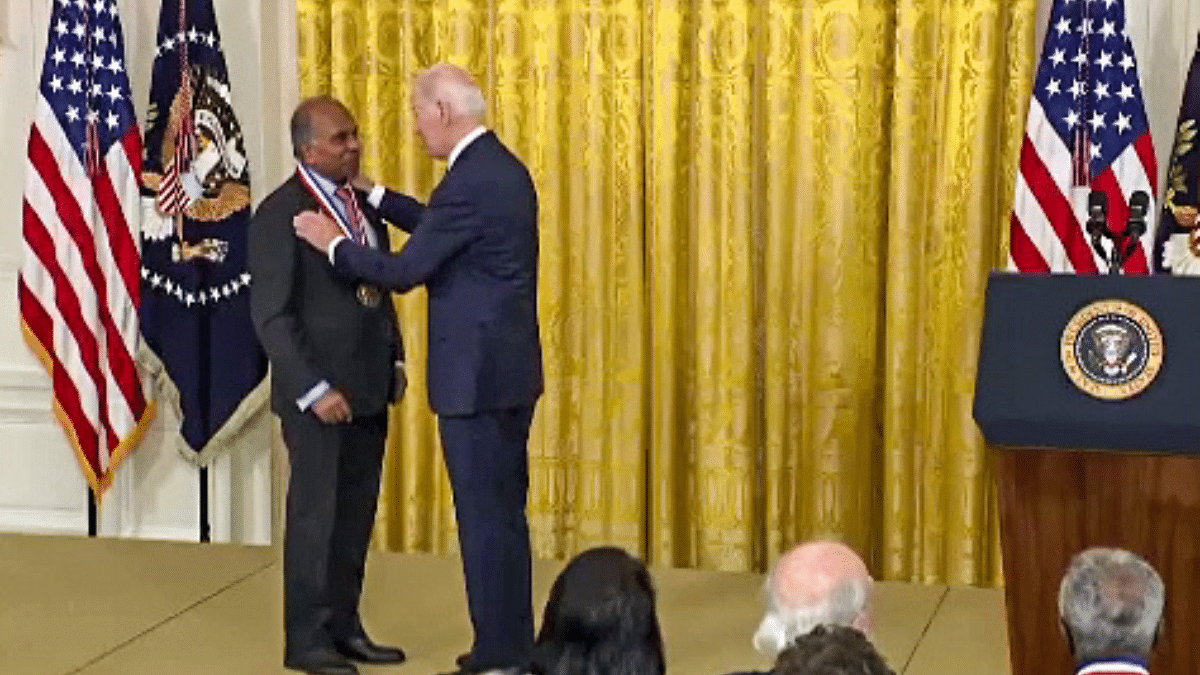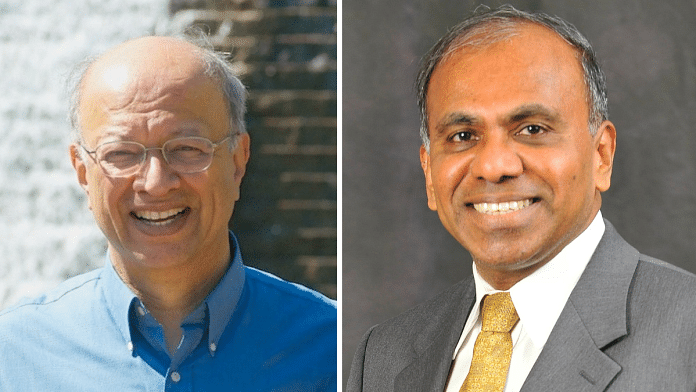New Delhi: As a professor at the University of California, Berkeley, in 2005, Ashok Gadgil’s pioneering innovation was a cooking stove, which changed the lives of over 46,000 women in war-torn Darfur, Sudan. The inexpensive, metal cooking stove stove, called the Darfur-Berkeley stove, reduced the need for firewood and led to less air pollution.
On 24 October, Gadgil was awarded the National Medal of Technology and Innovation — one of the highest scientific honours in the world — by US President Joe Biden. He was among two Indian-Americans who were honoured that day, the other being Professor Subra Suresh, who received the National Medal of Science.
Both Suresh and Gadgil are alumni of the Indian Institutes of Technology (IIT) Madras and Kanpur, respectively. They were praised by President Biden for “advancing scientific research that helped communities worldwide”.
Suresh also received the Padma Shri award in 2011.
Talking about Suresh, Professor Mahesh Panchagnula, Dean (Alumni and Corporate Relations), IIT Madras, told ThePrint, “It is a matter of great pride that one of our Distinguished Alumni Awardees and a longtime well-wisher of IIT Madras has won America’s highest honour in the space of scientific and technological innovation.”
Suresh, who was reportedly the first Asian-born American to head the National Science Foundation of the US, began his academic journey with an engineering degree from IIT Madras.

He then earned his master’s from Iowa State University and a Ph.D. in mechanical engineering from Massachusetts Institute of Technology (MIT) at the age of 25.
In 2012, during a talk at the National Academy of Sciences, Suresh recalled how his colleague had once challenged him, “Why are you working with dead materials in engineering, instead of with living materials?”
This, he said, inspired him to apply engineering principles to study human diseases, such as malaria and cancer. According to the MIT website, in 2004, he worked with scientists from MIT and the National University of Singapore to identify exactly how human blood cells re-engineer their shape when infected with malaria. This research was considered groundbreaking for the disease’s treatment.
Gadgil’s work, on the other hand, has focused on using scientific research to solve problems such as unsafe drinking water, excessive firewood consumption, and clean energy access in developing countries.
President @JoeBiden presented Ashok Gadgil, distinguished professor emeritus of @BerkeleyCEE, with the National Medal of Technology and Innovation, the nation’s highest honor for technological achievement!
Read more: https://t.co/hIS3GIl3Va pic.twitter.com/5DSzRHRPZH
— Berkeley Engineering (@Cal_Engineer) October 25, 2023
His first innovation in 1993 was UV Waterworks — a device that used ultraviolet light to disinfect water and prevent cholera outbreaks in India and Bangladesh. Like the Berkeley-Darfur stove, UV Waterworks was a low-cost innovation that was widely distributed.
Contributions to science & technology
Gadgil’s UV Waterworks is used by Water Health International Inc to provide cheap, clean drinking water to over 25 million people in Asia and Africa.
In an interview with the Lemenson Center in 2000, Gadgil had explained that his invention was meant to “treat water used by people in the developing world, so it must be low cost, low maintenance, and run on low power”.
Suresh, meanwhile, has held various positions across institutions in the US and abroad, such as the president of Carnegie Mellon University and the president of Nanyang Technological University in Singapore. He also founded the Global Research Council to promote cooperation in science research and funding around the world.
As the director of the National Science Foundation from 2011 to 2013, Suresh used his position to “emphasise the translation of basic research into commercial opportunities.” He established I-Corps, which sought funding opportunities for science research start-ups, and the Global Research Council, which enhanced networks for research across different disciplines to get easy access to funding.
Suresh has also worked to increase collaboration between different science disciplines. From his personal experience of using engineering to work with cell biology, he has become one of the few Americans to be elected to all three National Academies of Science, Engineering, and Medicine.
He has also expressed his gratitude for his Indian alma mater in his talks. While addressing the second edition of the Subra Suresh Distinguished Lecture Series at IIT Madras virtually on 2 March, his respect was on full display.
In the live-streamed lecture, he “acknowledged the privilege” of being invited to the series, and thanked IIT Madras for “starting his academic career at 18.”
(Edited by Richa Mishra)
Also Read: 12 men—India couldn’t find a single woman scientist worthy of Shanti Swarup Bhatnagar Prize



